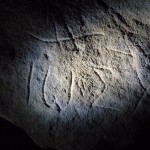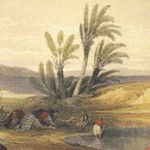
Vernacular Voices II: Ptolemaios, Phatres and Eirenais – Three Romano-Egyptians in Wadi Qash
Janet Robinson’s project Vernacular Voices is about ancient people living, travelling and most importantly communicating in writing in the Egyptian desert. Vernacular Voices I, published on Egyptological in May 2012 (http://egyptological.com/2012/05/31/vernacular-voices-8902), introduced a Romano-Egyptian called Phopis resting in a shady spot at Hans Winkler’s site RME21 (Robert Mond Expedition) in Wadi Qash. Vernacular Voices II discusses some hitherto unpublished graffiti signatures set in full sun at the celebrated ‘lost’ Hans Winkler rock-shelter RME18 which is also in Wadi Qash near the Roman garrisons of Krokodilo and Didymoi. [more…]

Book Review: Traveling Through the Deserts of Egypt
Traveling Through the Deserts of Egypt is a book of excerpts from the works of writers from Herodotus to modern times. The authors are the founding members of the Association for the Study of Travel in Egypt and the Near East (ASTENE) and between them have written a number of books and essays on travel writing. As one would expect with a publication from the American University in Cairo Press (AUC), the production values are excellent. [more…]
Edition - May, 2012

Vernacular Voices: Phopis, A Romano-Egyptian
In the transition to Late Antiquity, an undercurrent of vernacular culture across the Roman Empire was beginning to reassert its voice, as people on the margins of society grew in confidence. Many people were illiterate, or at least were only able to write their own name. So how can we be sure when and how this happened? One way is to listen to the voices of local people and ordinary travellers, as they took their rest in the shade. [more…]
Edition - July, 2011

A few thoughts about duality and the desert
Brian Alm’s excellent introductory article on ancient Egyptian religion in Edition 1 of Egyptological, the first in a series of five articles on the topic, includes a section on duality. I have often pondered the extent to which the Egyptians segregated religious belief, which potentially formed an explanatory but idealized model of life, from everyday pragmatism. Duality is a good case in point. [more…]
 By
By